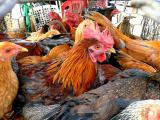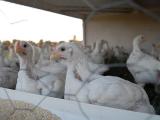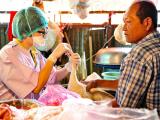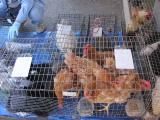Lab tests in China have confirmed 11 more H7N9 influenza infections over the past 3 days, including a fatal case, and Hong Kong has confirmed an H7N9 death in a previously reported case.
Those dead from the virus are a woman from Zhejiang province and a man from Hong Kong who got sick after visiting the mainland.
New H7N9 case reports are steadily piling up in eastern China, where a second wave of infections is well under way amid a ramp-up of street market activity ahead of the Lunar New Year later this month. The new cases are from three recent H7N9 hot spots in eastern China: Guangdong province, Zhejiang province, and the city of Shanghai.
Six of the newest cases are in men and five are in women. Patients' ages range from 28 to 78. Among the survivors, five are in critical condition, two are listed as severe, and three are stable.
Case details
In separate statements over the past 3 days, Hong Kong's Centre for Health Protection (CHP) provided details about all the newly reported cases, based on notifications it received from China's National Health and Family Planning Commission.
Four case-patients from Guangdong province include a 29-year-old man from Guangzhou who is hospitalized in critical condition, a 76-year-old man from Shenzhen who is in stable condition, and two patients from Foshan for whom few details were available.
However, a statement today in Chinese from the provincial health ministry, translated by and posted on the Avian Flu Diary infectious disease news blog, indicates that the Foshan patients are a 28-year-old woman who works as a poultry seller, hospitalized in stable condition, and a 46-year-old man who works as a driver and lives in district where poultry are raised. He is hospitalized in critical condition.
Both patients had ties to Foshan's Nanhai district, where health officials ordered a 2-day closure of live-bird markets, according to the translated health ministry report.
Five of the patients are from Zhejiang province and include a 75-year-old woman who had been exposed to poultry and died from her H7N9 illness on Jan 9, a 78-year-old man who is in critical condition, and a 34-year-old man who is in stable condition.
A CHP statement today said there were two more cases from Zhejiang province, but it didn't have any details. However, a statement today from the provincial health ministry, translated and posted by Avian Flu Diary, said the patients are women, ages 41 and 59, from the city of Ningbo. Both are hospitalized with severe infections.
The two patients from Shanghai are a 58-year-old woman and a 56-year-old man. Both are hospitalized in critical condition and had been exposed to poultry, according to the CHP.
The second newly reported death is that of a 65-year-old man from Hong Kong whose illness was first reported by the CHP on Jan 8. He became ill after traveling to the mainland city of Shenzhen, where he walked past one of the city's live-bird markets but did not go in.
The CHP said the man died this evening and that it is monitoring five of his close contacts and 98 other contacts. The CHP said eight contacts have reported nonspecific symptoms, and respiratory specimens for seven have tested negative for the H7 virus. Test results are pending for the remaining sample.
The 11 new cases raise the number of confirmed H7N9 cases in China and its close neighbors to 174. The two new fatalities push the number of deaths in the outbreak so far to 52.
Latest WHO update
In related developments, the World Health Organization (WHO) said China has notified it of six more lab-confirmed H7N9 infections, one of them fatal, all of which were initially reported late last week. Of the six patients, three had exposure to poultry; one of the three works in the wholesale poultry industry. Two of the patients are in critical condition, one is in serious condition, and two have mild illnesses.
They include a 54-year-old man from Jiangsu province, a 79-year-old woman and a 30-year-old man from Zhejiang province, a 59-year-old woman and a 42-year-old woman from Guangdong province, and a 38-year-old man from Fujian province who died from his illness. The man who died had underlying illnesses, including tuberculosis and pneumoconiosis, according to the WHO.
So far there is no sign of sustained human-to-human transmission, the WHO said. Most of the cases are sporadic, and health officials strongly suspect that many of the cases involve exposure to infected poultry and their environments in market settings.
Elsewhere, local health officials in southwestern China's Guizhou province identified a suspected H7N9 case on Jan 11, in a 38-year-old who had been working in Zhejiang province before he returned home on Jan 4 after having cough and dizziness a month ago, Xinhua, China's state news agency, reported today.
The man was hospitalized on Jan 8 after his symptoms worsened, and he died the next day. If his case is confirmed, his illness will be the first to be reported from Guizhou province.
See also:
Jan 11 CHP statement
Jan 12 CHP statement
Jan 13 CHP statement
Jan 13 Avian Flu Diary post on Guangdong province cases
Jan 13 Avian Flu Diary post on Zhejiang province cases
Jan 13 Xinhua story





















